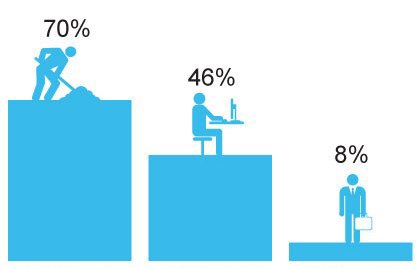QA nowadays. The Switcher Principle, or Why the Industry Critically Misses Competency
Friends, today I had the opportunity to answer questions on the long-playing topic “How to become a Tester, what are the prospects, and what is necessary to get into this sphere.”
As usual at the beginning of any opinions or presentations, I will give brief (very brief) information about myself:
I work in QA two and a half years. During this time he changed three companies, worked on various projects. I talked a lot with the founders of companies and the organizers of trainings / conferences / seminars. Conducted interviews and monitored the development of the market.
Therefore, the following opinion is only the result of personal observations.

I will share the following parts of the post:
1. Observations
2. Possible solutions
As I already mentioned, recently I had the opportunity to answer the questions of another IT altruist journalist who wants to help newcomers who plan to change their occupation and retrain into testers. After completing the review, and re-reading it, I realized that one of the points I got was much more massive and emotional than the rest. The thoughts described in this paragraph set the tone for the entire recall. It turned out something about which they usually say “apparently hooked”. That is exactly what happened.
That's why I decided to share with you. It became interesting to know whether one of them “catches” me, or are there other caring ones? Well, and, of course, I sincerely hope that my thoughts, which did not concern the journalist’s election pen, can cause an interesting discussion.
So the question is.
Why is the Testing industry unskilled?

The situation on the market is such that almost 90% of the specialists who come to QA and testing are the so-called “switches” (from the English switch ). That is, people who, already having experience and practical knowledge in one field, decide to completely change their occupation, motivated by the desire to find a more promising industry for self-realization.
In my experience, there are dozens of interviews of such “switches”: bank, trade, security, lawyers, accountants, builders, oil workers, aircraft engineers, teachers, energy and solar energy engineers, veterinarians, and even musicians.
And at the interview, all as one with a gleam in their eyes assure that they suddenly understood: testing is their calling! They sincerely fell in love with him after the first book and see their development right here and now.
If you look around the sphere as a whole, it becomes clear that there is practically no specialized education, there is no accessible practice for beginners, and there is no place to take them.
I mean the normal, half a centimeter deeper Theory, and not the concepts that lie on the surface. And I mean normal Practice, and not "well, yes, we were given two sites to test ...".
That is, often the "switches" have a shallow theoretical knowledge, and do not have practice. As a result, we have a large coefficient of incompetence at the entrance to the sphere.
And I in no way presume to judge people in this. These are the realities of the industry. I myself once came here, talking about my love for Testing, and about two months (and 4 more finished) of practice after the courses.
And all this should have formed a certain factor of loyalty to the candidates, if the competition for each place was not so great.
As a result, the situation becomes more complicated. In addition, for the most part, low-skilled applicants,tens of hundreds rushing for each new Junior QA vacancy, are also adding non-standard requirements for applicants, increasing every year due to the development and constantly growing competitiveness of the industry.
Of course, along with this popularity, entrepreneurs came who wanted to make money on it. Dozens of courses that “produce” QA “specialists” have grown by leaps and bounds. As a rule, the founders of such courses shoot out their company slogans from the series:
“Go to IT before it's too late!”
“Low entry threshold”
“Easy money in a comfortable office”
“In five years, your salary will be measured in tens of hundreds of dollars!”
“A guarantee of employment ! " .
Realities are significantly different from these myths. And this is noticeable in how the situation with guaranteed employment worsened, which used to be a selling “trick” of Testing courses.
What's next.
I would not want to touch on political issues, so I will do it here only in context. In the last year, several historical events took place, as a result of which a crisis began in Ukraine, forcing people to look for ways to survive and massively “immigrate” to IT. This made the market “heat up” even more.
Growing competition in the market and competition were to form an increase in the general competence of the sphere. But here I recall old Raymond Hull and his notorious “Peter Principle” , which provoked a situation when those specialists who had come to the industry earlier that remained at their level of incompetence were involved in hiring new specialists. As a result, the overall growth of the sphere’s incompetence, if it didn’t increase, it certainly didn’t fall.
One way or another, the “switches” were in the realm. What's next?
Personal experience

While working in QA, over time, I began to notice that there were a large number of companies developing testing processes (in fact, it turned out that these companies simply “keep” those guys who are testing “in the state”), there is one big problem that goes hand in hand with the mentioned “principle” and stems from the general incompetence of the sphere.
Testing has long remained a part of software development, where everything somehow happens. But not organized. Not executed. It is not measured and is not planned in a qualitative way.
This is a problem of quality testing and quality management.
That is, there are sorely lacking people who could reasonably and professionally determine whetherhappens , and what is needed for its organization, improvement and measurement.
I began to search for competencies, trainings, courses, seminars. I was surprised to find that there is practically no exchange of knowledge on these topics in the field. More precisely, the situation is this:
There are a couple of forums that are poorly supported or for the most part simply contain copy-paste articles from Western authors. There are a couple of online webinars aimed more at the already formed testing departments and at the advanced training of test managers. There was a feeling that low competence creeps in much deeper ...
But how to get there ?! How to bridge the gap between the moment when you are a mature manual (for example) tester and the moment when you are already a test manager with three testing teams in the department and a car of completed projects behind you?
Having talked with a number of people who could potentially teach such things in the future, and asking about it, I learned that they had already made suchmistakes . But people are simply not interested in learning. Groups in the areas of “Advanced and Advanced Testing Study” or “Test Management for Beginners” started occasionally, and as a result were closed due to unprofitability.
You can be outraged and say: “Come on! The network has a bunch of books on the topics of building and managing the testing process. Take it and do it! ”
Of course! But having familiarized myself with some authors of such books and the methods that they propose, I saw a significant, insurmountable difference between the construction of processes in the West and in the countries of the former Soviet Union.
This difference is a mentality.
The guys can calmly talk about the use of certain approaches, but they simply do not work for us . Accordingly, some “local” tools are needed, adapted things that could be applied. Which were already created by someone, described. All this brings us back, narrowing the heap of search for Russian-speaking Internet space.
And the most common thing that can be heard on the topic of building the testing process from scratch is “There is no single tool, everything is individual.”
Yes, sticks, guys! What, nothing at all ?!
The "Switcher Principle" and its impact on QA

The "Switcher Principle" is emerging. Once in IT, “switches” most often have a two- or three-fold increase in the level of salary relative to their previous activities. Compared to previous income, living standards have risen. And thisalmost always often turns out to be enough to get into a comfort zone in which a person does not seek to improve their professional skills, learn, track and keep up with the development of technologies and the market as a whole.
Further, much depends on the company's policy regarding salary increases (and the availability of experienced, qualified mentors who supervise newcomers, but if there are any in the company, most likely the current article does not apply to such companies or teams). And since, on average, this policy is similar in all modern IT companies, the “switcher” manages to work out for about a year, so that there comes a time when his salary could grow for the first time (well, what? Everyone is raised after a year ...) .
If this happens, and the “switcher” gets promoted, this encourages him to continue to remain in a comfortable zone, as a result of which he may remain at his level of incompetence. If he received a refusal to increase, then motivation increases (or management requires it) to increase the level of professional skills. Then a more positive scenario unfolds, and the skill level begins to grow.
Undoubtedly, among the “switches” there are many people who find application to their talents, ambitions and skills within the scope of QA. As a result, they become true professionals in their field. Such people are now moving our sphere, setting the bar of professionalism that we need to strive for.
Thinking about it takes me somewhere even deeper into the field of software development, systems theory and other voluminous things. There, where the question of the need for testing in principle once became the first time, and why it still has not ceased to exist.
And on the contrary, what prevents testing from becoming a powerful, competent, obviously necessary process that effectively evaluates and improves the quality of software, and not an additional activity somewhere at the end of the development cycle.
Honestly, friends, I deceived you when I indicated the item “Possible solutions” at the beginning of the article. You were probably encouraged that I would cite and describe them at the end of the article. But I have no idea how to resolve this issue. For me, it remains open.
As usual at the beginning of any opinions or presentations, I will give brief (very brief) information about myself:
I work in QA two and a half years. During this time he changed three companies, worked on various projects. I talked a lot with the founders of companies and the organizers of trainings / conferences / seminars. Conducted interviews and monitored the development of the market.
Therefore, the following opinion is only the result of personal observations.

I will share the following parts of the post:
1. Observations
- Why is the Testing industry unskilled?
- Personal experience
- The Switcher Principle and its Impact on QA
2. Possible solutions
As I already mentioned, recently I had the opportunity to answer the questions of another IT altruist journalist who wants to help newcomers who plan to change their occupation and retrain into testers. After completing the review, and re-reading it, I realized that one of the points I got was much more massive and emotional than the rest. The thoughts described in this paragraph set the tone for the entire recall. It turned out something about which they usually say “apparently hooked”. That is exactly what happened.
That's why I decided to share with you. It became interesting to know whether one of them “catches” me, or are there other caring ones? Well, and, of course, I sincerely hope that my thoughts, which did not concern the journalist’s election pen, can cause an interesting discussion.
So the question is.
“Who in Ukraine most often makes a choice in favor of QA?”
Observations
Why is the Testing industry unskilled?

The situation on the market is such that almost 90% of the specialists who come to QA and testing are the so-called “switches” (from the English switch ). That is, people who, already having experience and practical knowledge in one field, decide to completely change their occupation, motivated by the desire to find a more promising industry for self-realization.
In my experience, there are dozens of interviews of such “switches”: bank, trade, security, lawyers, accountants, builders, oil workers, aircraft engineers, teachers, energy and solar energy engineers, veterinarians, and even musicians.
And at the interview, all as one with a gleam in their eyes assure that they suddenly understood: testing is their calling! They sincerely fell in love with him after the first book and see their development right here and now.
If you look around the sphere as a whole, it becomes clear that there is practically no specialized education, there is no accessible practice for beginners, and there is no place to take them.
I mean the normal, half a centimeter deeper Theory, and not the concepts that lie on the surface. And I mean normal Practice, and not "well, yes, we were given two sites to test ...".
That is, often the "switches" have a shallow theoretical knowledge, and do not have practice. As a result, we have a large coefficient of incompetence at the entrance to the sphere.
And I in no way presume to judge people in this. These are the realities of the industry. I myself once came here, talking about my love for Testing, and about two months (and 4 more finished) of practice after the courses.
And all this should have formed a certain factor of loyalty to the candidates, if the competition for each place was not so great.
As a result, the situation becomes more complicated. In addition, for the most part, low-skilled applicants,
Of course, along with this popularity, entrepreneurs came who wanted to make money on it. Dozens of courses that “produce” QA “specialists” have grown by leaps and bounds. As a rule, the founders of such courses shoot out their company slogans from the series:
“Go to IT before it's too late!”
“Low entry threshold”
“Easy money in a comfortable office”
“In five years, your salary will be measured in tens of hundreds of dollars!”
“A guarantee of employment ! " .
Realities are significantly different from these myths. And this is noticeable in how the situation with guaranteed employment worsened, which used to be a selling “trick” of Testing courses.
What's next.
I would not want to touch on political issues, so I will do it here only in context. In the last year, several historical events took place, as a result of which a crisis began in Ukraine, forcing people to look for ways to survive and massively “immigrate” to IT. This made the market “heat up” even more.
Growing competition in the market and competition were to form an increase in the general competence of the sphere. But here I recall old Raymond Hull and his notorious “Peter Principle” , which provoked a situation when those specialists who had come to the industry earlier that remained at their level of incompetence were involved in hiring new specialists. As a result, the overall growth of the sphere’s incompetence, if it didn’t increase, it certainly didn’t fall.
One way or another, the “switches” were in the realm. What's next?
Personal experience

While working in QA, over time, I began to notice that there were a large number of companies developing testing processes (in fact, it turned out that these companies simply “keep” those guys who are testing “in the state”), there is one big problem that goes hand in hand with the mentioned “principle” and stems from the general incompetence of the sphere.
Testing has long remained a part of software development, where everything somehow happens. But not organized. Not executed. It is not measured and is not planned in a qualitative way.
This is a problem of quality testing and quality management.
That is, there are sorely lacking people who could reasonably and professionally determine whether
I began to search for competencies, trainings, courses, seminars. I was surprised to find that there is practically no exchange of knowledge on these topics in the field. More precisely, the situation is this:
There are a couple of forums that are poorly supported or for the most part simply contain copy-paste articles from Western authors. There are a couple of online webinars aimed more at the already formed testing departments and at the advanced training of test managers. There was a feeling that low competence creeps in much deeper ...
But how to get there ?! How to bridge the gap between the moment when you are a mature manual (for example) tester and the moment when you are already a test manager with three testing teams in the department and a car of completed projects behind you?
Having talked with a number of people who could potentially teach such things in the future, and asking about it, I learned that they had already made such
You can be outraged and say: “Come on! The network has a bunch of books on the topics of building and managing the testing process. Take it and do it! ”
Of course! But having familiarized myself with some authors of such books and the methods that they propose, I saw a significant, insurmountable difference between the construction of processes in the West and in the countries of the former Soviet Union.
This difference is a mentality.
The guys can calmly talk about the use of certain approaches, but they simply do not work for us . Accordingly, some “local” tools are needed, adapted things that could be applied. Which were already created by someone, described. All this brings us back, narrowing the heap of search for Russian-speaking Internet space.
And the most common thing that can be heard on the topic of building the testing process from scratch is “There is no single tool, everything is individual.”
Yes, sticks, guys! What, nothing at all ?!
The "Switcher Principle" and its impact on QA

The "Switcher Principle" is emerging. Once in IT, “switches” most often have a two- or three-fold increase in the level of salary relative to their previous activities. Compared to previous income, living standards have risen. And this
Further, much depends on the company's policy regarding salary increases (and the availability of experienced, qualified mentors who supervise newcomers, but if there are any in the company, most likely the current article does not apply to such companies or teams). And since, on average, this policy is similar in all modern IT companies, the “switcher” manages to work out for about a year, so that there comes a time when his salary could grow for the first time (well, what? Everyone is raised after a year ...) .
If this happens, and the “switcher” gets promoted, this encourages him to continue to remain in a comfortable zone, as a result of which he may remain at his level of incompetence. If he received a refusal to increase, then motivation increases (or management requires it) to increase the level of professional skills. Then a more positive scenario unfolds, and the skill level begins to grow.
Undoubtedly, among the “switches” there are many people who find application to their talents, ambitions and skills within the scope of QA. As a result, they become true professionals in their field. Such people are now moving our sphere, setting the bar of professionalism that we need to strive for.
Possible solutions
Thinking about it takes me somewhere even deeper into the field of software development, systems theory and other voluminous things. There, where the question of the need for testing in principle once became the first time, and why it still has not ceased to exist.
And on the contrary, what prevents testing from becoming a powerful, competent, obviously necessary process that effectively evaluates and improves the quality of software, and not an additional activity somewhere at the end of the development cycle.
Honestly, friends, I deceived you when I indicated the item “Possible solutions” at the beginning of the article. You were probably encouraged that I would cite and describe them at the end of the article. But I have no idea how to resolve this issue. For me, it remains open.
